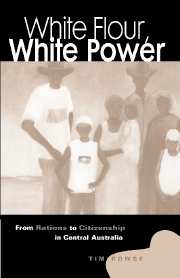7 - ‘Assimilation’
from PART THREE
Published online by Cambridge University Press: 23 October 2009
Summary
‘Assimilation’ signifies a doctrine of nationhood better than it defines a distinct and internally coherent practice of government. Jeremy Beckett has suggested that ‘the assimilation policy must be understood as a statement about the nature of Australia in a post-depression, post-war, post-colonial world’. He argues that Paul Hasluck, the Commonwealth minister responsible for enthusiastic statements of assimilation, articulated a ‘vision’ of Australia which ‘turned its back on the past and proposed a new beginning in the form of an affluent, classless, monocultural society: the poor would forget their former privations; migrants would forget Europe; and the Aborigines would forget their past. In return, all would enjoy the “Australian way of life” … ’ Citizenship, the goal of assimilation, became important during the Cold War ‘as a counter to ideas of class struggle’.
W.E.H. Stanner, in 1964, queried whether Aborigines could yet subscribe to this vision. Introducing a book of essays on assimilation, he wrote: ‘Our intentions are now so benevolent that we find it difficult to see that they are still fundamentally dictatorial … a great many aborigines [sic] are empty of motive to believe in us, and tend to look for what they have often found, a worm in the apple.’ Beckett also has described assimilation policy as contradictory: ‘[It] used the goal of eventual entry into the community as a justification for segregating Aborigines on settlements, and the goal of eventual citizenship as a justification for curtailing their civil rights.’
- Type
- Chapter
- Information
- White Flour, White PowerFrom Rations to Citizenship in Central Australia, pp. 107 - 117Publisher: Cambridge University PressPrint publication year: 1998



